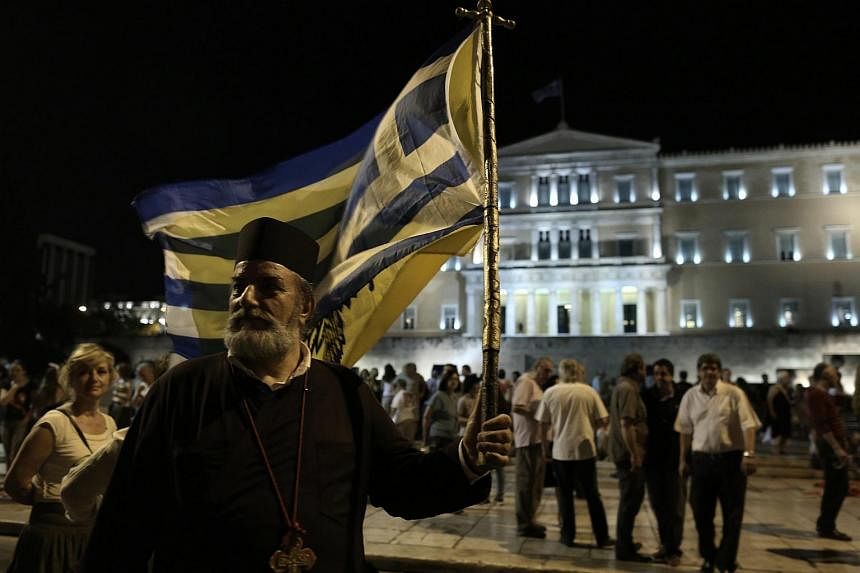ATHENS (AFP) - The Greek central bank warned for the first time on Wednesday that the country could suffer a "painful" exit from the eurozone and even the EU if it fails to reach a bailout deal with international creditors.
The warning came as negotiations over the release of the last 7.2 billion euros ($8.1 billion) in rescue funds from Greece's massive international bailout remained deadlocked, with payment deadlines looming.
All eyes are on a meeting of the 19 eurozone countries to take place Thursday in Luxembourg, but several officials including Greek Finance Minister Yanis Varoufakis said they were not expecting a breakthrough in the cash-for-reforms standoff there either.
Asked during a visit to Paris whether he thought an accord could be reached at the meeting of eurozone finance ministers in Luxembourg, he said late Wednesday: "I don't think so. Now it is up to political leaders to arrive at an accord."
In a sign the EU's top financial brass are seriously considering the implications of a "Grexit", the head of Germany's central bank, Jens Weidmann, said it would "change the character of the monetary union" - but not destroy it.
And underscoring growing global concern about the crisis, US Federal Reserve Chair Janet Yellen warned the world economy could see significant turmoil if Greece and its creditors failed to do a deal.
"This is a very difficult situation. In the event that there is not agreement I do see the potential for disruptions that could affect the European economic outlook and global financial markets," Yellen said.
Elected on an anti-austerity platform in January, Greek Prime Minister Alexis Tsipras warned Wednesday that an EU "fixation" on pension cuts would scupper any hopes of reaching an agreement to avert a catastrophic default.
Tsipras said his government had gone as far as it could to meet the demands of the International Monetary Fund, European Union and European Central Bank for tax hikes and pension reform.
"There is no room for further cuts without affecting the core of the (pension) system," Tsipras said after meeting with visiting Austrian Chancellor Werner Feymann, one of the few European leaders supporting Greece in the talks.
"If Europe insists on this incomprehensible fixation... it must accept the cost of a development that will benefit no one in Europe." In one of the starkest warnings from a Greek institution, the Bank of Greece said failure to reach an agreement would start "a painful course that would lead initially to a Greek default and ultimately to the country's exit from the euro area and - most likely - from the European Union".
Leaving the single currency would lead to a deep recession, dramatic declines in incomes and a spike in unemployment in the southern European nation, the bank said.
Greek bank deposits had already dropped by nearly 30 billion euros between December and April, to 128 billion euros, it said.
On the other side of the fence, Bundesbank chief Weidmann warned that while failure to reach a deal would cause some contagion, the eurozone did not depend on Greece.
"A Grexit could change the character of the monetary union," he said in an interview with French, Italian and Spanish media. "But this also changes when individual countries do not live up to their responsibilities to ensure a stable currency." Responsibility for Greece's future lies entirely with its government, he said, adding that the consequences of it leaving the euro "would be hard to control" for Athens.
The Athens stock exchange fell 3.15 per cent on Wednesday, its fourth straight day in the red.
Polls show most Greeks support the government's negotiating strategy, though its approval rating has steadily fallen.
Some 7,000 people gathered in Athens on Wednesday evening to protest against the creditors' demands for further cuts, police said. In a show of support for the government, protesters carried banners reading: "End Austerity" and "Democracy, Not Blackmail".
Tsipras is set to travel to the St Petersburg International Economic Forum on Thursday and is scheduled to hold talks with President Vladimir Putin on Friday.
Although the Russian government has stressed that Greece has never requested direct financial aid, observers say Tsipras is trying to send a message to Europe that he still has other cards to play.

